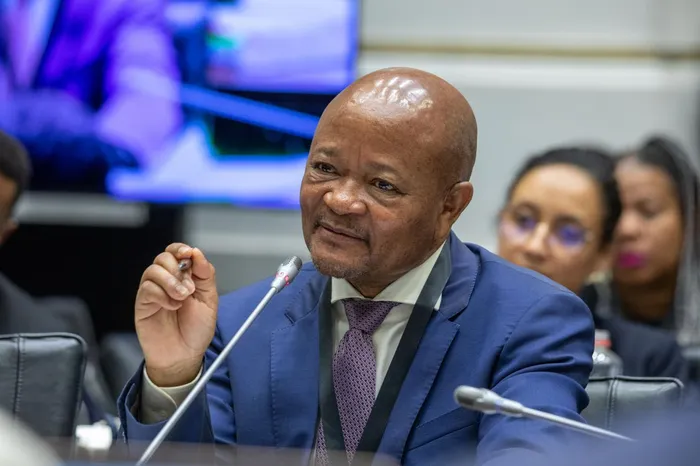
Police Minister Senzo Mchunu testifying on his second day at the parliamentary inquiry investigating allegations made by SAPS KwaZulu-Natal Police Commissioner Lieutenant-General Nhlanhla Mkhwanazi.
Image: Zwelethemba Kostile / Parliament of RSA
THE implication of suspended police minister Senzo Mchunu’s admission that he disbanded the Political Killings Task Team (PKTT), a decision he claims was backed by President Cyril Ramaphosa, could point to political interference or overstepping of boundaries.
That is the view of Criminologist Dr Simon Howell as Mchunu is expected to return to the Parliament’s Ad Hoc Committee investigating the allegations made by SAPS KwaZulu-Natal provincial head Lieutenant-General Nhlanhla Mkhwanazi.
Mkhwanazi has accused Mchunu of being linked to a criminal syndicate and that his decision to suddenly disband the PKTT was part of protecting the syndicate from being investigated.
“Only the commissioner can have input on the operational side of things and ministers and politicians generally may only have input on the policy side of things,” said Howell.
Mchunu has repeatedly denied the allegations and is expected to provide more information on what led to the PKTT being disestablished when he faces MPs. In his testimony on Friday, Mchunu told MPs that he had informed Ramaphosa of his decision, to which the president ‘agreed’.
However, when announcing the establishment of the Madlanga commission of inquiry on July 12, Ramaphosa said: “These allegations, if proven true, threaten to undermine the confidence of South Africans in the ability of the South African Police Service to protect them and to effectively fight crime and corruption. As we intensify the fight against crime, it is vital that we safeguard the integrity and credibility of the police and other law enforcement agencies. These allegations therefore call for an urgent and comprehensive investigation….The Commission will investigate allegations relating to the infiltration of law enforcement, intelligence and associated institutions within the criminal justice system by criminal syndicates.”
The presidency did not respond to questions on Mchunu’s claims that Ramaphosa was aware of the decision to disband the PKTT.
The task team has since been reinstated and has recorded several breakthroughs following the return of dockets initially removed from KZN and kept at SAPS headquarters in Pretoria.
Weighing in on what Mchunu testified, former Western Cape police commissioner Dr Lennit Max said: “According to his evidence, my assessment of his response is that if he did it, he just informed the president what he did. He did not ask the president for permission to close down the unit. I think when he found out things were going to get hot, he informed the president so that the president could be aware about what he did. So his evidence does not indicate that he got permission from the president. His evidence indicates that he informed the president of the decision he already took.”
Max said the financial figures Mchunu cited could be a cause for concern, noting that "if so much money went into that task team with so little success," it raises questions. However, the correct procedures still needed to be followed, he said.
“That is, firstly, according to the evidence of Mkwanazi and Masemola he (Mchunu) did not want to attend any briefing session about the task team. So in other words, he didn’t have insight into the working of the task team which might have convinced him to take the decision he took. He claimed that there was no integrated ministerial committee. In the absence of that, then based on the briefings he could have got from the task team as well as the provincial and national commissioner (if) his views (were still) the same that the task team is not living up to expectations, then he could have first consulted with the president,” Max said.
Cape Times
Related Topics: